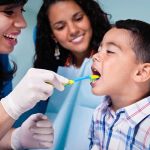How to Protect Your Teeth: Foods to Avoid for Better Oral Health
As someone who values oral health, I've always been curious about what contributes to maintaining strong, healthy teeth. Over the years, I've learned that oral hygiene isn't just about brushing and flossing; it also heavily depends on the foods we consume. Some foods, while delicious, can slowly damage your teeth if consumed too frequently. In this article, I'm going to share the key foods that you should avoid if you want to keep your teeth strong and healthy.
The Battle Against Sugary Snacks
First and foremost, sugar is the most notorious culprit when it comes to dental health. It’s something we all know we should limit, yet it’s so tempting! From candy to sugary drinks, sugar feeds the harmful bacteria in our mouths. These bacteria produce acids that attack the enamel, the protective layer on our teeth. This leads to cavities, which can cause pain and long-term dental issues.
Let me tell you a little story. I once indulged in sugary soda and candy on a weekend road trip. By the end of the trip, I noticed some sensitivity in my teeth. Turns out, the sugar had worked its damage on my enamel, making my teeth more vulnerable to decay. After that experience, I realized how quickly sugar could affect my smile.
The Effects of Sugar on Your Teeth
When sugar is consumed, bacteria in the mouth feed on it and produce acids. These acids erode the enamel on your teeth, weakening them over time. This is why it's crucial to reduce sugar intake, especially sticky or sugary foods that linger in your mouth. If you can’t avoid sugary snacks entirely, try brushing your teeth afterward to minimize the damage.
Starchy Foods and Their Impact
It might surprise you to know that starchy foods can also pose a risk to your dental health. Foods like chips, crackers, and white bread can break down into sugar in your mouth. This means they also fuel the harmful bacteria that attack your enamel. They’re not as obviously sugary as candy or soda, but the starch they contain can be just as damaging.
The Hidden Danger of Starch
When we chew starchy foods, they get broken down into sugars in the mouth. If we don’t clean our teeth properly afterward, these sugars can stay in our mouths and feed the bacteria. This creates a perfect environment for plaque buildup, leading to potential tooth decay and gum disease. Try to choose whole-grain alternatives or rinse your mouth with water after consuming starchy foods to reduce the risks.
Acidic Foods That Can Erode Tooth Enamel
Citrus fruits, tomatoes, and certain vinegars are highly acidic and can erode tooth enamel over time. While these foods are full of vitamins and good for overall health, consuming them frequently, especially without proper care, can harm your teeth. This doesn’t mean you need to avoid them entirely, but it’s important to consume them in moderation and always rinse your mouth with water afterward.
I've learned this lesson the hard way. A few years ago, I developed some tooth sensitivity after drinking lemon water every morning. The acidity of the lemon was wearing down the enamel on my teeth, and I didn’t even realize it. It wasn’t until I switched to drinking water with a little less acid that I noticed my teeth feeling better.
Protecting Your Teeth from Acidic Foods
To protect your enamel, try drinking acidic beverages through a straw to reduce the direct contact with your teeth. Also, avoid brushing your teeth immediately after consuming acidic foods or drinks, as this can further damage the softened enamel. Wait for about 30 minutes before brushing to allow your enamel to harden again.
Hard Foods: A Risk for Tooth Fractures
While nuts and hard candies can be delicious, they also come with a serious risk for your teeth. Biting down on something too hard can cause fractures or cracks in your teeth, which can lead to tooth pain or even the need for expensive dental procedures. Hard foods can also get stuck in the grooves of your teeth, making it easier for plaque to build up.
How to Avoid Tooth Fractures
To prevent fractures, avoid chewing on ice or hard candies, and be cautious when eating tough, crunchy foods like raw carrots or apples. If you love hard foods, try to break them into smaller, bite-sized pieces before eating. This reduces the stress placed on your teeth and lowers the risk of fractures.
Excessive Alcohol and Its Effects on Your Teeth
Drinking alcohol excessively can lead to a dry mouth, which makes it harder for your mouth to produce saliva. Saliva plays a crucial role in keeping your teeth clean and neutralizing acids. Without enough saliva, your teeth are more vulnerable to decay and erosion. Additionally, some alcoholic drinks, like wine, can be acidic and contribute to enamel erosion over time.
It's important to stay hydrated and balance your alcohol intake with water to prevent dry mouth. If you must drink wine or beer, make sure to rinse your mouth with water afterward to reduce the impact on your teeth.
How to Care for Your Teeth After Drinking Alcohol
To protect your teeth, drink water between alcoholic beverages to maintain saliva production. After drinking, rinse your mouth with water to wash away any acidic residue. If you're a wine lover, consider using a straw to limit direct contact with your teeth.
Conclusion: Making Better Food Choices for Your Teeth
Ultimately, maintaining healthy teeth requires more than just brushing and flossing—it’s about being mindful of what you eat and drink. By avoiding or limiting sugary snacks, starchy foods, acidic fruits, and hard items, you can protect your enamel and reduce the risk of cavities, gum disease, and other dental issues. Remember, small changes in your diet can have a big impact on the health of your teeth in the long run.







 D3 Dental of Horsham4.0 (342 review)
D3 Dental of Horsham4.0 (342 review) Don C. Kalant Sr. DDS, FACD, FICD3.0 (32 review)
Don C. Kalant Sr. DDS, FACD, FICD3.0 (32 review) All Family Dental and Braces4.0 (689 review)
All Family Dental and Braces4.0 (689 review) Oral Surgery Hawaii4.0 (385 review)
Oral Surgery Hawaii4.0 (385 review) Spencer Dental & Braces4.0 (459 review)
Spencer Dental & Braces4.0 (459 review) Midwest Dental - Eagan4.0 (150 review)
Midwest Dental - Eagan4.0 (150 review) The Importance of Oral Health Education During Pregnancy for a Healthy Pregnancy
The Importance of Oral Health Education During Pregnancy for a Healthy Pregnancy Best Tips for Brushing Your Teeth Properly for Healthy Gums: Essential Techniques for Oral Health
Best Tips for Brushing Your Teeth Properly for Healthy Gums: Essential Techniques for Oral Health Why Skipping Dental Checkups Can Lead to Bigger Oral Health Problems
Why Skipping Dental Checkups Can Lead to Bigger Oral Health Problems Advantages of Porcelain Dental Restorations
Advantages of Porcelain Dental Restorations How Can Diabetes Cause Tooth and Gum Problems? Preventing and Managing Oral Health Issues
How Can Diabetes Cause Tooth and Gum Problems? Preventing and Managing Oral Health Issues Healthy Habits for Promoting Good Oral Health and Hygiene: Tips for a Healthy Smile
Healthy Habits for Promoting Good Oral Health and Hygiene: Tips for a Healthy Smile